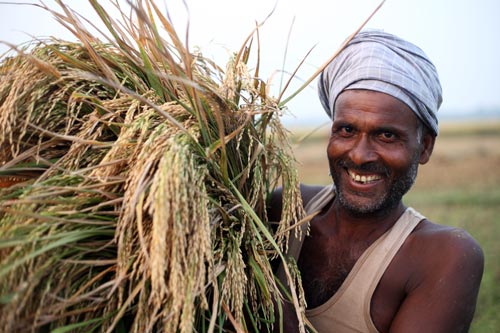
The rates of growth of staple crop yields in South Asia are insufficient to meet the projected demands in the region. With 40 percent of the world’s poor living in South Asia, the area composed of eastern India, Bangladesh and Nepal has the largest concentration of impoverished and food insecure people worldwide. At the same time, issues of resource degradation, declining labor availability and climate change (frequent droughts and rising temperatures) pose considerable threats to increasing the productivity of farming systems and rural livelihoods. Thirty percent of South Asia’s wheat crop is likely to be lost due to higher temperatures by 2050, experts say.
“These ecologies are regionally important for several reasons,” said Andrew McDonald, Project Leader, Cereal Systems Initiative for South Asia, CIMMYT. “First, they have a higher density of rural poverty and food insecurity than any other region. Second, yield gaps for cereal staples are higher here than elsewhere in South Asia – highlighting the significant growth potential in agriculture.”
According to McDonald, there has been some successes due to increased investment and focus on intensification in these areas over the past 10 years. A CIMMYT-led initiative, the Cereal Systems Initiative for South Asia (CSISA) has contributed to major outcomes such as rapid uptake of early-planted wheat, the use of zero-tillage seed drills and long-duration, high-yielding wheat varieties in eastern India.
CSISA, in close collaboration with national partners, has been working in this region since 2009 to sustainably enhance the productivity of cereal-based cropping systems, as well as to improve the livelihoods of millions of smallholder farmers.
“Climate-resilient practices are gaining confidence in the areas we are working. More than 500,000 farmers adopted components of the early rice-wheat cropping system in Bihar and eastern Uttar Pradesh last year,” said R.K. Malik, Senior Agronomist, CIMMYT. “Early sowing can protect the crop from late-season heat damage and increase yields. It’s a non-cash input that even smallholders can benefit from and is one of the most important adaptations to climate change in this region.”
To increase the spread of these innovations and increase farmers’ access to modern farming technologies, CSISA is working to strengthen the network of service providers.
“This region has a large number of smallholder farmers and ownership of machines by smallholders is often not economically viable,” highlighted Malik. “In Indian states of Bihar, Odisha and eastern Uttar Pradesh, CSISA has facilitated more than 2,100 progressive farmers to become local entrepreneurs through relevant skills, information and training during the last three years.”
The U.S. Agency for International Development and the Bill & Melinda Gates Foundation have recently approved Phase III of CSISA, running from December 2015 to November 2020. Building on the momentum and achievements of Phase I and II, Phase III will work to scale up innovations, strengthen local capacity and expand markets to support the widespread adoption of climate-resilient agricultural technologies in partnership with the national and developmental partners and key private sector actors.
“CSISA has made its mark as a ‘big tent’ initiative that closes gaps between research and delivery, and takes a systems approach that will continue to be leveraged in Phase III through strategic partnerships with national agricultural systems, extension systems and agricultural departments and with civil society and the private sector,” said McDonald.
Implemented jointly with International Rice Research Institute and International Food Policy Research Institute, the main four outcomes of Phase III focus on technology scaling, mainstreaming innovation into national systems, development of research-based products and reforming policies for faster technology adoption.
 Capacity development
Capacity development 
